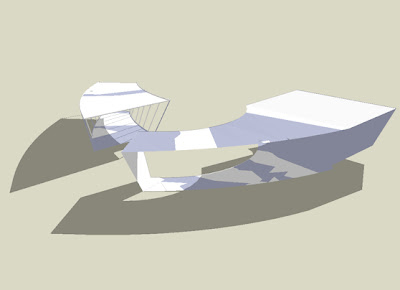 It should be noted that this chapter is not the golden rule of concepts and that there is no golden rule. I know, its frustrating..."...but I want structure and strict guidelines to follow so I know if I'm doing it right!" Rengel is a very good starting place for understanding them but it is one of [many] approaches. Explore elsewhere and everywhere.
It should be noted that this chapter is not the golden rule of concepts and that there is no golden rule. I know, its frustrating..."...but I want structure and strict guidelines to follow so I know if I'm doing it right!" Rengel is a very good starting place for understanding them but it is one of [many] approaches. Explore elsewhere and everywhere.
Unfortunately, you will also find that people will sometimes disagree with your interpretations, peers and instructors alike, usually in a mixed and confusing way (even more frustrating). Don't be offended and don't be afraid to have a productive conversation with your dissenters as this will only help you in your journey. I like to think that the more people who are able to understand your concept, usually a direct result of your articulation audibly and visibly, the more successful the concept is. Like anything else, it takes practice.
As for myself, I associate conceptualization with design process because it is my belief that they drive each other simultaneously. My process might be comparable to a combination of natural/unnatural disasters or maybe even Stephen Hawking's theory of what a person would experience if they were sucked into a blackhole (kudos for whoever looks that up and emails one of us). Look at the name of my blog (and the header for a description) and you will get an idea of how I view things. The thought of having a linear process might be appealing to others but it scares me to think that some people view it as a check list. I am constantly looking to be influenced by everything around me, regardless of how far into a project I'm in, and reconnecting, merging, or scrapping new ideation and old ideation. While that might not necessarily be appropriate for someone in the real world, we are students and we can afford to do things like this. I can attest to the mental growth that will occur if you are always open and not afraid to toss something you like for something that you can convey better conceptually...and to repeat the process until you've exhausted all avenues.
This is an example of my own work from a project last year when I was a third year in Stoel's studio. We were charged with picking a location in the building and coming up with a way to make that location better for student presentations. My concept was "[end/ex]ogenous influence" and my location was the lobby. It started with analysis ( light, circulation, use, sound, problems for presenting in the lobby, etc) and progressed to ideation with different media usage (3-d modeling, painting, sketching, photography, etc). I spent a lot of time looking at books, magazines, the internet, inside and outside Gatewood, our campus, Greensboro- everywhere. I crossed analytical process with ideation and external influences (precedents) constantly throughout the project. Though I changed concepts many times in between the beginning and end, my final concept was born from my design process as a whole. Its difficult to explain on a blog but if you are interested, feel free to come and talk to me about it.


 A little cheat sheet...
A little cheat sheet...
"Concept" defined, via google, as:
1. comprehensive or organizing idea (strategy)
2. unit of knowledge abstracted from a set of characteristics attributed to a class of objects, relations, or entities
3. abstract or general idea inferred or derived from specific instances
From Rengel:
types: philisophical, thematic, functional, mood-related, stylistic
main concept: helps to tie the entire project together by providing a dominant structure or idea that all other design ideas adhere to
organizational concept: guides arrangment or order, placement, divisions, and relationships helping to establish a scheme(s) for the project
character concept: style, image, theme helping to give personality(ies) to the project as a whole
Sunday, September 28, 2008
Concepts for Dummies
After reading Rengel this weekend you all should have a general idea of what concepts are and some of the ways a designer goes about attaining the most appropriate one for their project. I refrained from using the word "selecting" in the previous sentence because attaining a concept goes beyond a situation similar to picking which laundry detergent you want to buy at the grocery store. I will be the first to admit that Chapter 6 is a lot to take in one reading (it still hurts my brain when I look at it in one sitting), especially the varying ways in which the word "concept" is used. I recommend reading it over several times and taking notes each time. It also might help to look at some of your previous projects to see where you might have already used some of the criteria mentioned in the chapter to help your understanding.
Subscribe to:
Post Comments (Atom)

No comments:
Post a Comment